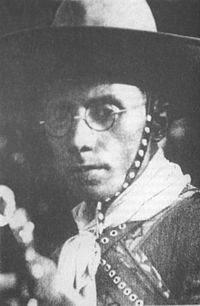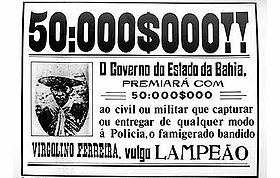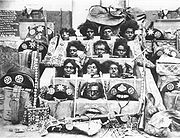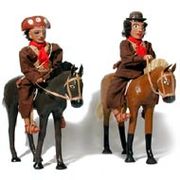
Lampião
Encyclopedia

Cangaço
Cangaço is the name given to a form of "social banditry" in the Northeast of Brazil in late 19th and early 20th centuries. This region of Brazil is known for its aridness and hardships, and in a form of reaction against the domination of the land owners and the government, many men and women...
band, marauder
Marauder
A marauder is a bandit, outlaw, raider or such like who moves about in roving fashion looking for plunder.Other uses of marauder, usually derived from the above include:in " Football"...
s and outlaw
Outlaw
In historical legal systems, an outlaw is declared as outside the protection of the law. In pre-modern societies, this takes the burden of active prosecution of a criminal from the authorities. Instead, the criminal is withdrawn all legal protection, so that anyone is legally empowered to persecute...
s who terrorized the Brazil
Brazil
Brazil , officially the Federative Republic of Brazil , is the largest country in South America. It is the world's fifth largest country, both by geographical area and by population with over 192 million people...
ian Northeast in the 1920s and 1930s.
Biography

Serra Talhada
Serra Talhada is a city in the state of Pernambuco, Brazil. It is located at 07º59'31" South and 38º17'54" West, at an altitude of 429 metres. As of 2009, its estimated population by IBGE was 80.294 people. Its area is approximately 2980 km sq.-History:...
, in the semi-arid
Semi-arid
A semi-arid climate or steppe climate describes climatic regions that receive precipitation below potential evapotranspiration, but not extremely...
backlands (sertão
Sertão
In Portuguese, the word sertão first referred to the vast hinterlands of Asia that Lusitanian explorers encountered. In Brazil, the geographical term referred to backlands away from the Atlantic coastal regions where the Portuguese first settled in South America in the early sixteenth century...
) of the state of Pernambuco
Pernambuco
Pernambuco is a state of Brazil, located in the Northeast region of the country. To the north are the states of Paraíba and Ceará, to the west is Piauí, to the south are Alagoas and Bahia, and to the east is the Atlantic Ocean. There are about of beaches, some of the most beautiful in the...
, as the third child of José Ferreira da Silva and Maria Lopes, a humble family of peasants. Until 21 years old, he was a hard-working leathercraft artisan (he was also literate and used reading glasses—both quite unusual features for the rough and poor region where he lived). He lived with his family in a deadly feud with other local families until his father was killed in a confrontation with the police in 1919. Virgulino sought vengeance and proved to be extremely violent in doing so. He became an outlaw and was incessantly pursued by the police
Police
The police is a personification of the state designated to put in practice the enforced law, protect property and reduce civil disorder in civilian matters. Their powers include the legitimized use of force...
(whom he called macacos
Macaca (slur)
Macaca is a word used by George Allen in 2006 that began a controversy because it sounds similar to the French word "macaque". It was reported by journalists to be a racial slur against African immigrants in some European cultures; and by Zairian painter Tshibumba Kanda Matulu to be a pejorative...
or monkeys).

Caatinga
Caatinga is a type of vegetation, and an ecoregion characterized by this vegetation in the northeastern part of Brazil. The name "Caatinga" is a Tupi word meaning "white forest" or "white vegetation"...
(dry shrubs and brushwood typical of the dry hinterland of Brazil's Northeast.)
Their weapons were mostly stolen from the police and paramilitary units and consisted of Mauser
Mauser
Mauser was a German arms manufacturer of a line of bolt-action rifles and pistols from the 1870s to 1995. Mauser designs were built for the German armed forces...
military rifles and a variety of smaller firearms including Winchester rifle
Winchester rifle
In common usage, Winchester rifle usually means any of the lever-action rifles manufactured by the Winchester Repeating Arms Company, though the company has also manufactured many rifles of other action types...
s, revolvers and the prized Mauser semi-automatic pistol
Mauser C96
The Mauser C96 is a semi-automatic pistol that was originally produced by German arms manufacturer Mauser from 1896 to 1937...
. Lampião used to attack small cities and farms in seven states, kill people and cattle, take hostages for ransom, torture, fire-brand, maim, rape, and ransack. He was joined in 1930 by his girlfriend, Maria Déa, nicknamed Maria Bonita (Beautiful Maria), who, like other women in the band, dressed like cangaceiros and participated in many of their actions. They had a daughter in 1932.
Death
Finally, on July 28, 1938, Lampião and his band were betrayed by one of his supporters and were ambushed in one of his hideouts, the Angico farm, in the state of SergipeSergipe
Sergipe , is the smallest state of the Brazilian Federation, located on the northeastern Atlantic coast of the country. It borders on two other states, Bahia to the south and west and Alagoas to the north, and to the east is the Atlantic Ocean...
, by a police troop armed with machine guns. In a quick battle, Lampião, Maria Bonita and 9 of his troops were killed. Their heads were cut and sent off to Salvador, the capital of Bahia
Bahia
Bahia is one of the 26 states of Brazil, and is located in the northeastern part of the country on the Atlantic coast. It is the fourth most populous Brazilian state after São Paulo, Minas Gerais and Rio de Janeiro, and the fifth-largest in size...
, for examination by specialists at the State Forensic Institute, and later, for public exhibition, and only after 1971 were the families of Lampião and Maria Bonita able to reclaim the preserved heads to finally bury them.
Notable band members

- Antonio Ferreira - Lampião's eldest brother, died in an accident in 1926.
- Levino Ferreira - Lampião's brother, killed in battle with police in July 1925.
- Luis Pedro - a member of the band for over a decade, he returned to die by Lampião's side even though he may have been able to escape.
- Corisco - feared for his cruelty. There was speculation that he would take control of the band after Angicos, where had not been present. He was killed by police in 1940.
- Angelo Roque - a trusted lieutenant who was also not present when Lampião was finally killed. Operated until 1940 when he surrendered to police after being assured that he would not be killed for his crimes. He was initially sentenced to 95 years in prison, which was later reduced to 30 years and then commuted in 1950.
Folk hero
Thus started the legend of Lampião and Maria Bonita, who became subjects of innumerable folk stories, books, comics of CangaçoCangaço
Cangaço is the name given to a form of "social banditry" in the Northeast of Brazil in late 19th and early 20th centuries. This region of Brazil is known for its aridness and hardships, and in a form of reaction against the domination of the land owners and the government, many men and women...
popular pamphlets (cordel literature
Cordel literature
Cordel literature are popular and inexpensively printed booklets or pamphlets containing folk novels, poems and songs, which are produced and sold in fairs and by sidestreet vendors in the Northeast of Brazil...
), songs, movies, and a number of TV soap opera
Soap opera
A soap opera, sometimes called "soap" for short, is an ongoing, episodic work of dramatic fiction presented in serial format on radio or as television programming. The name soap opera stems from the original dramatic serials broadcast on radio that had soap manufacturers, such as Procter & Gamble,...
s, with all the elements of drama
Drama
Drama is the specific mode of fiction represented in performance. The term comes from a Greek word meaning "action" , which is derived from "to do","to act" . The enactment of drama in theatre, performed by actors on a stage before an audience, presupposes collaborative modes of production and a...
, passion, and violence typical of "Far West" stories. By many, he was considered a folk hero
Folk hero
A folk hero is a type of hero, real, fictional, or mythological. The single salient characteristic which makes a character a folk hero is the imprinting of the name, personality and deeds of the character in the popular consciousness. This presence in the popular consciousness is evidenced by...
, a kind of Robin Hood
Robin Hood
Robin Hood was a heroic outlaw in English folklore. A highly skilled archer and swordsman, he is known for "robbing from the rich and giving to the poor", assisted by a group of fellow outlaws known as his "Merry Men". Traditionally, Robin Hood and his men are depicted wearing Lincoln green clothes....
and the head of a peasant revolt
Peasant revolt
Peasant, Peasants' or Popular is variously paired with Revolt, Uprising and War and may refer to :*Daze Village Uprising 209 BC*Yellow Turban Rebellion 184...
against the all-dominant, feudal farmers of the region (the so-called coronels
Coronelismo
Coronelismo was the system of machine politics in Brazil under the Old Republic . Known also as the "rule of the coronels", the term referred to the classic boss system under which the control of patronage was centralized in the hands of a locally dominant oligarch known as a coronel, particularly...
). The fact remains that he was the most notorious of the many rural bandits (in his own admission) that infested the poor hinterland of Northeast Brazil. Lampião was mentioned in the lyrics of "Ratamahatta", song of Brazil metal band Sepultura, from their Roots record.

